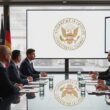US President Donald Trump set out on a confrontational course with the announcement of far-reaching tariffs on goods from Europe and Asia yesterday evening. He declared his plans during a press event in the Rose Garden of the White House, part of the “Liberation Day” declared by him.
Trump threatened with a base tariff of 10% on all imports to the US and the elevation of parallel higher tariffs on goods of the country’s largest trading partners. According to the announcement from the US, future tariffs on imports from the European Union, Japan and South Korea will be 20% or more. For imports from Vietnam, a tariff rate of 46% and for imports from Taiwan, a tariff rate of 32% will apply.
Today, media report on the first reactions and statements of international partners and politics. EU Commission President von der Leyen spoke to journalists about a “severe blow to the world economy”. The announced tariffs would have “apocalyptic consequences for millions of people on earth”. Von der Leyen explained the EU’s reactions to Washington’s plans:
“We are finalizing the first package of measures as a response to the steel tariffs and are now preparing further measures to protect our interests and companies, if the negotiations fail.”
The chairman of the Trade Committee in the EU Parliament, Bernd Lange of the SPD, declared the announcements to be a “challenge”. Lange expects the EU to suffer a loss in the “high two-digit billion range”. Trump’s tariffs are a “challenge” to Europe.
The commissioner for economic affairs, Robert Habeck (Bündnis90/ Die Grüne), has not been cited with any reactions or comments in the media, nor has the outgoing Chancellor Olaf Scholz or the Union leader Friedrich Merz. Dirk Jandura, the president of the Federal Association of Wholesale, Foreign Trade and Services (BGA), is quoted as saying:
“I say it openly: We will feel this. The tariffs will be implemented in price increases and that means in many cases a decline in sales.”
For smaller companies, already weakened from the past difficult years, “this could also mean the end”. The president of the German Association of the Automobile Industry (VDA), Hildegard Müller, stated:
“It is the departure of the US from the rule-based global trade order – and thus the departure from the basis for global wealth creation and corresponding growth and prosperity in many regions of the world. This is not America first, it is America alone.”
The president of the Kiel Institute for the World Economy, Moritz Schularick, described the new US tariffs as “a severe shock for global trade”. On the European level, the German CSU politician Manfred Weber, president of the largest party in the European Parliament, stated:
“For our American friends, today is not the day of liberation, but the day of grudge. Donald Trump’s tariffs do not defend fair trade, they attack it out of fear and harm both sides of the Atlantic. Europe stands united, ready to defend its interests and open for fair, resolute talks.”
Italian Prime Minister Giorgia Meloni criticized the US plans on social media, holding the tariffs “for a wrong approach”. Meloni emphasized in her statement:
“We will do everything we can to achieve an agreement with the United States and prevent a trade war that would inevitably weaken the West in favor of other global actors.”
Spanish Prime Minister Pedro Sánchez announced he would “react decisively”, stating:
“Europe will defend itself, we will act quickly, proportionally and with unity.”
Swedish Prime Minister Ulf Kristersson expressed his concern in a statement on the government’s website:
“(..) therefore I deeply regret the path the US has taken to limit trade through higher tariffs. We want no growing trade barriers. We want no trade war. That would make our populations poorer and the world more dangerous in the long run.”
Polish Prime Minister Donald Tusk wrote on X:
“Friendship means partnership. Partnership means real and genuine reciprocity. It is necessary to make appropriate decisions.”
The BBC quoted British Prime Minister Keir Starmer with a first reaction, stating it is now a matter of “not getting into a trade war”.
China’s Ministry of Commerce (MOFCOM) released an official statement yesterday evening, stating Beijing will “take resolute countermeasures to protect its own interests”. Further, it says:
“In a trade war, there is no winner and protectionism leads to nothing. China demands the US to immediately lift the unilateral tariffs and resolve the differences with the trade partners through dialogue.”
Japanese Prime Minister Shigeru Ishiba announced, according to Tokyo Weekender, that Tokyo will “put all options on the table” to react to Washington’s plans. In a statement to the parliament, it is stated:
“Japan is a country that invests the most in the United States, so we wonder if it is reasonable for (Washington) to apply uniform tariffs to all countries. This is a point we have pointed out and will continue to point out.”
Chilean President Gabriel Boric warned at a business forum in India that Trump’s measures will not only lead to economic uncertainty, but also “agreed rules” and “principles of international trade” will be put in question.
Australia will, according to Prime Minister Anthony Albanese, not retaliate with tariffs. “We will continue to strongly advocate for these unjustified tariffs to be lifted for our exporters”, so the statement to the press. The tariffs announced by the US are, for Albanese, “not the act of a friend”.
Russia is excluded from the plans, as Russian experts explain that the trade with the US has already strongly declined due to the sanctions in recent years and as the US is currently seeking to improve and restart the relations with Russia.





